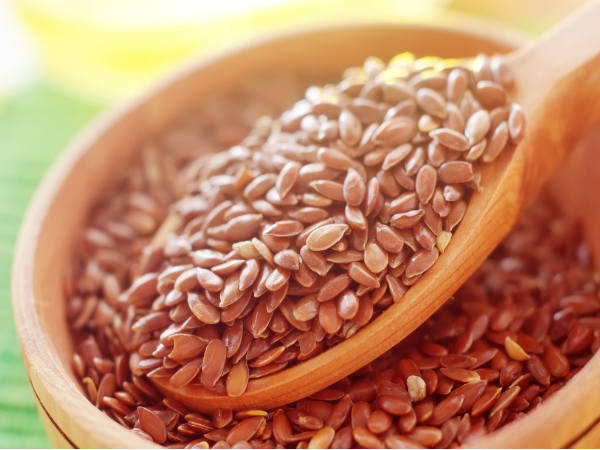
1. Helps with weight loss
Flax milk is made up of 95 per cent of secoisolariciresinol diglucoside, a potent phytoestrogen called lignans. This may help reduce body weight and fat accumulation and thus, helps with weight loss. Flax milk also has zero lactose and cholesterol that may help with weight management. [1]
2. Has anti-tumour properties
Flax milk is a functional food with antitumorigenic and antioxidant functions due to the presence of omega-3 fatty acids, ALA, fibres and lignans. These compounds may help inhibit the growth of cancer cells, especially in breast and ovarian cancer. Also, the vital nutrients in flax milk such as magnesium, vitamin B1, selenium, phosphorus and zinc contribute to decreasing the risk of cancer. [2]
 Are Soaked Walnuts Good For People With Diabetes?
Are Soaked Walnuts Good For People With Diabetes?
3. Lowers cholesterol
The high content of omega-3 fatty acid in flax milk may help lower total and LDL cholesterol levels and increase HDL levels in the body. Also, the fibre in the milk helps lower blood cholesterol by reducing its absorption.
4. Manages diabetes
Flax milk possesses anti-hyperglycemic effects due to the presence of lignans and dietary fibres. Consumption of flax milk may help lower glucose levels and manage diabetes. Another study has shown that the high levels of C-reactive protein (CRP) in the blood increases the risk of diabetes. ALA in flax milk helps decreases the CRP by 75 per cent and reduce the risk of diabetes. [3]
5. Treats menopausal symptoms
A study has shown that flax milk has a protective effect against menopausal symptoms such as hot flashes. Estrogen deficiency is common during menopause. Lignans in flax milk are phytoestrogens that may help balance the levels of estrogen in the body and treat menopausal symptoms through diet. [4]
 Overdosing On Ginger Could Be Bad For People With These Medical Conditions
Overdosing On Ginger Could Be Bad For People With These Medical Conditions

6. Good for skin
Flax milk may cause positive effects on the skin such as increasing skin smoothness, and hydration, and reducing scaling, sensitivity, water loss and roughness. The high amount of proinflammatory oxylipins in flax milk can also help reduce inflammatory factors and promote healthy ageing.
7. Good for heart
Flax milk is the richest source of plant-based omega-3 fatty acids and ALA which have a positive impact on cardiovascular diseases. Consumption of these two nutrients may help in the prevention of heart diseases such as myocardial infarction, calcified atherosclerotic plaque, stroke and many others.
 21 Amazing Health Benefits Of Curry Leaves: Weight Loss, Infections, Diabetes And More
21 Amazing Health Benefits Of Curry Leaves: Weight Loss, Infections, Diabetes And More
READ RELATED: Officials REJECT a 'game-changing' cancer drug for NHS patients
8. Helps in brain development
There are two types of omega-3 fatty acids in flax milk: docosahexaenoic acid (DHA) and eicosapentaenoic acid (EPA). The DHA helps in pre and postnatal brain development while EPA helps maintain good behaviour and mood. Flaxseed milk may help improve brain development along with good memory, learning ability and spatial tasks. [5]
9. Good for digestion
Flax milk is a good source of both soluble and insoluble fibre. The insoluble fibre in the milk acts as a laxative and prevent constipation by bulking the faecal and reducing bowel transit time. On the other hand, water-soluble fibre and omega-3 in flax milk help maintain gut flora and keep the digestive system healthy.
10. Improves hair health
The omega-3 in flax milk is known to fight off many hair problems such as dry scalp, brittle hair and dandruff. This vital nutrient significantly helps supply nutrition to the roots of hairs and make them strong and healthy.
 This COVID-19 Vaccine Side Effect Could Be Confused With A Breast Cancer Symptom, Says Study
This COVID-19 Vaccine Side Effect Could Be Confused With A Breast Cancer Symptom, Says Study

Side Effects Of Flaxseed Milk
- Flax milk contains certain toxic compounds such as cyanogenic glycosides and linatine that get converted into hydrogen cyanide in the body and may cause hydrogen poisoning. However, the poisoning is caused by high consumption of flax milk as consumption of around 15-100 g did not increase the blood cyanide levels. [6]
- Another toxic compound linatine in flax milk may inhibit the action of vitamin B6 in the body.
- Other anti-nutrients in flax milk such as phytic acid and trypsin may interfere with the absorption of certain nutrients. However, there are no scientific data supporting the toxicity of flax milk due to these compounds.
 Health Benefits Of Acerola Cherries, A Powerhouse Of Vitamin C
Health Benefits Of Acerola Cherries, A Powerhouse Of Vitamin C

How To Make Flaxseed Milk
Ingredients
- One-third cup flax seeds
- 4-4.5 cups water
- Sieve or Cheesecloth or unworn pantyhose
- Dates or honey for sweetener (optional).
- Vanilla extract for flavouring (optional).
Method
- Blend flax seeds with 3 cups of water to form a thick and creamy paste.
- Sieve with cheesecloth in a jar.
- Add the remaining one or one and a half cups of water, along with dates or honey, and blend the milk again.
- Consume fresh or allow it to cool for an hour and then consume.
Note: It is difficult to strain the flax milk due to its gel-like characteristics. To do so, allow the milk to sit for 10 minutes. This will help settle down the seed particles at the bottom which you can efficiently remove with the help of a spoon.
 Does Polycystic Ovary Syndrome (PCOS) Increase Risk Of COVID-19 Infection?
Does Polycystic Ovary Syndrome (PCOS) Increase Risk Of COVID-19 Infection?
To Conclude
Flax milk is the new alternative to regular milk with an abundance of health benefits. It is flavourful and makes for the best choice among people who are allergic to casein and whey proteins in cow’s milk.
Source:










